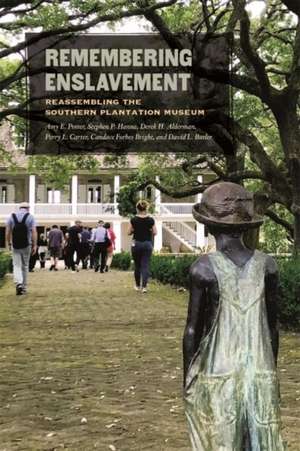Remembering Enslavement
Autor Amy E. Potteren Limba Engleză Hardback – 29 mar 2022
Remembering Enslavement explores plantation museums as sites for contesting and reforming public interpretations of slavery in the American South. Emerging out of a three-year National Science Foundation grant (2014-17), the book turns a critical eye toward the growing inclusion of the formerly enslaved within these museums, specifically examining advances but also continuing inequalities in how they narrate and memorialize the formerly enslaved.
Using assemblage theory as a framework, Remembering Enslavement offers an innovative approach for studying heritage sites, retelling and remapping the ways that slavery and the enslaved are included in southern plantation museums. It examines multiple plantation sites across geographic areas, considering the experiences of a diversity of actors: tourists, museum managers/owners, and tour guides/interpreters. This approach allows for an understanding of regional variationsamong plantation museums, narratives, and performances, as well as more in-depth study of the plantation tour experience and public interpretations. The authors conclude the book with a set of questions designed to help professionals reassemble plantation museum narratives and landscapes to more justly position the formerly enslaved at their center.
Preț: 674.16 lei
Preț vechi: 923.52 lei
-27% Nou
Puncte Express: 1011
Preț estimativ în valută:
129.01€ • 133.93$ • 107.58£
129.01€ • 133.93$ • 107.58£
Carte tipărită la comandă
Livrare economică 24 martie-07 aprilie
Preluare comenzi: 021 569.72.76
Specificații
ISBN-13: 9780820360935
ISBN-10: 0820360937
Pagini: 277
Dimensiuni: 152 x 229 mm
Greutate: 0.61 kg
Editura: University of Georgia Press
ISBN-10: 0820360937
Pagini: 277
Dimensiuni: 152 x 229 mm
Greutate: 0.61 kg
Editura: University of Georgia Press
Descriere
Explores plantation museums as sites for contesting and reforming public interpretations of slavery in the American South. The book turns a critical eye on the growing inclusion of the formerly enslaved within these museums, specifically examining advances but also continuing inequalities in how they narrate and memorialize the formerly enslaved.
